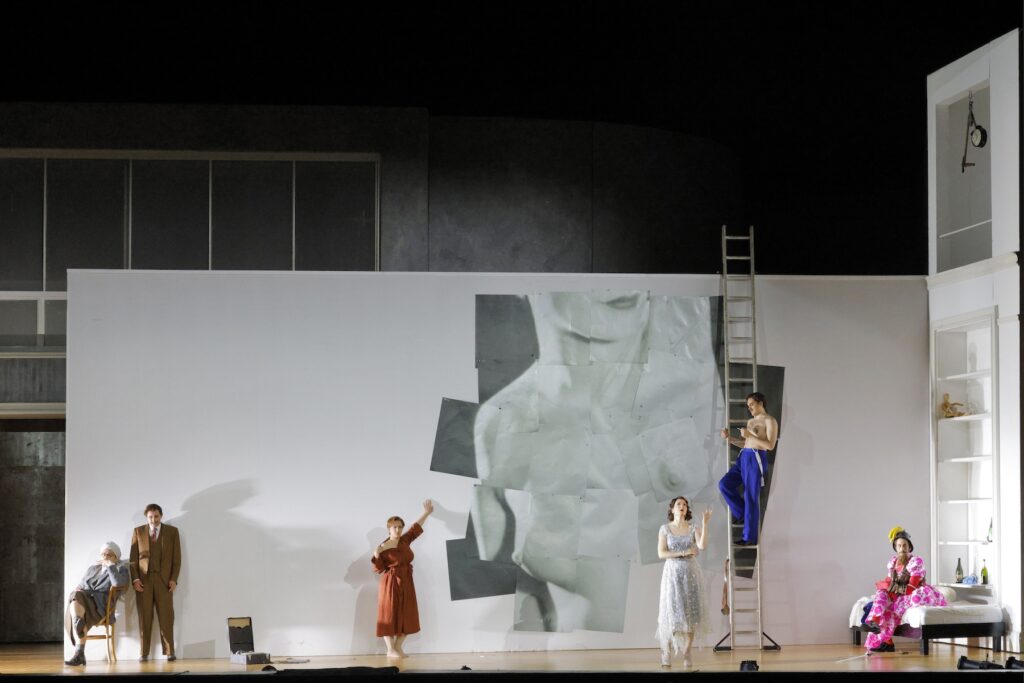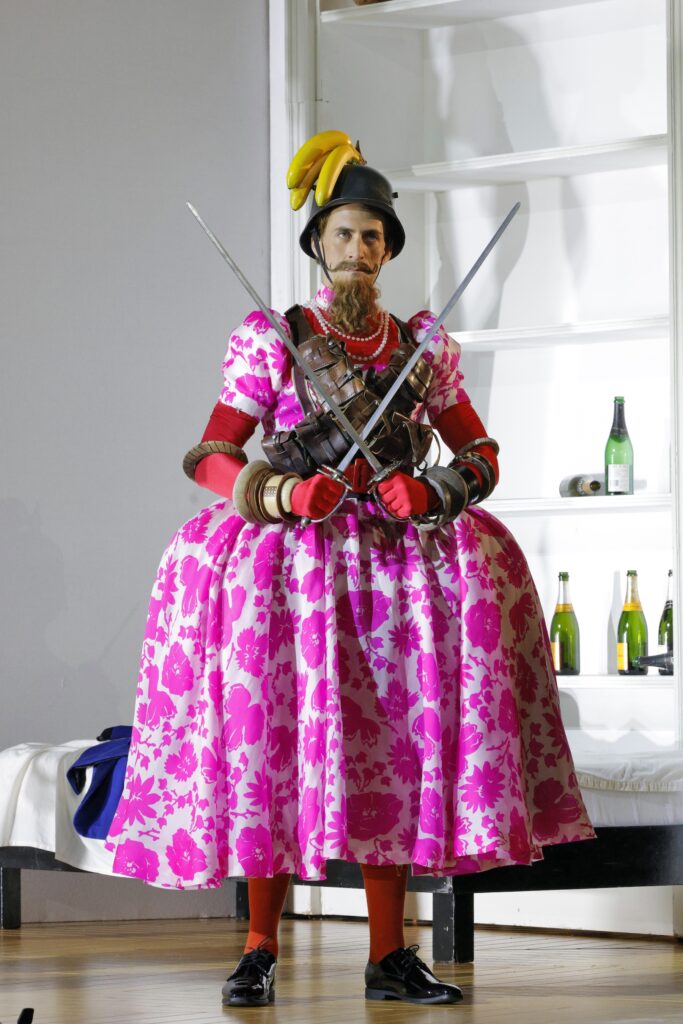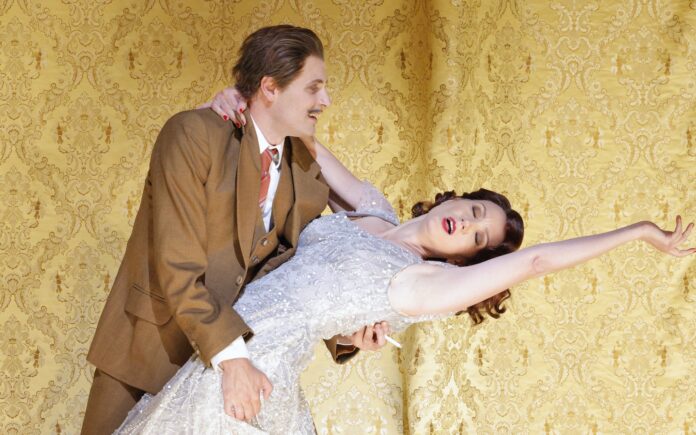With a full century behind them to choose from, SF Opera’s 2023-24 season has had a feeling of “throw things at the wall and see what sticks.” There’s plenty of speculation as to why (particularly from another publication—which I won’t link to here—that attempts to draw parallels between SF Opera and the embattled SF Symphony), but if I had to take a personal guess, I’d say that it’s the century itself. The pre-show curtain speech thanks the audience for both the past 100 years of support and hopes they’ll stay on for another hundred. To do that, you’ll have to give folks something to talk about.
That’s certainly been the case for the past year. Though recent productions (Omar, The Elixir of Love) have yielded mixed results, they’ve also shown an attempt to take bold risks, particularly with the aesthetics. Last show Innocence may be the season’s indisputable triumph in its marrying of traditional opera style with daring visuals and touchy subject matter. The SF Opera wants people to get literal and figurative eyes on them for a long time.
Their season finale, an Old Hollywood-meets-German Expressionist take on Handel’s Partenope (through June 28 at the War Memorial Opera House), is about as “mixed result” as you can get. It’s one of those old stories with dated gender politics that goes on longer than it should. Yet, you can’t really argue with the music of the guy who wrote “Hallelujah” for Messiah. At least some of its gender politics can be chalked up to its attempt at Shakespeare-style cross-dressing for the sake of laughs, but it’s also a show where the cis-male characters are so defined by their lack of “manhood” that their roles are traditionally played by castratos. (This production just goes for countertenors.)

The story, now set in 1920s Paris, revolves around the eponymous Partenope (French soprano Julie Fuchs)—no longer a queen as in the original, but just a Jean Harlow-esque object of all men’s desires. As befitting someone of that distinction, she has a great many suitors vying for her affection, such as the hapless Armindo (NY-based countertenor Nicholas Tamagna). Yet, the lady seems particularly taken with Arsace (Italian countertenor Carlo Vistoli). Unbeknownst to anyone, Armindo’s friend and supposed fellow suitor Eurimene is actually an in-disguise Rosmira (Argentine mezzo Daniela Mack), Arsace’s heartbroken ex who wants revenge on him for leaving her the way he did.
Confusion is had. Battles are fought. Romance is found. Happily ever after. Also, with seemingly nothing else to do with the character Emilio (US tenor Alek Shrader), this production finds him walking in the background giving commentary on the characters, in a look slightly reminiscent of Henry Spencer from Eraserhead.
As with SF Opera’s recent production of The Magic Flute, I find myself enjoying an abstract, German Expressionist-type design as much as the next lover of film noir. Yet, in both cases, I have to ask what service it does to the story? For this production, I’m at a loss as to what set designer Andrew Lieberman and lighting designers Adam Silverman (original) and Gary Marder (current) were going for with this supposedly zany comedy? Sure, a comedy can use noir aesthetics (just look at the film Barton Fink), but here it’s trying to fit a square peg into a round hole. Not only that, the lighting is so balanced to one side that oftentimes entire actions by the characters that are lost to the shadows.
Plus, the livestream I saw seemed to be missing a significant number of subtitles, which led to further confusion. It was easy to pick up the characters’ emotions through the performers’ body language and expressions (well done, one and all), but there were arias where it seemed as if only the first two lines were translated into English, the rest untranslated Italian, and maybe one or two final lines in English again. If you’re going to include the entire text, you might as well let us in on what it says.

Then there are the aforementioned gender politics, with men not being “real men” (hence the sight of Hadleigh Adams’ Ormonte in a dress with two swords) and women all being conniving vixens who just need love to melt their cold hearts. Or something. Perhaps the reason they chose the 1920s motif was to evoke the sort of era where stories like that were still common. Yet, the aforementioned Harlow and the incomparable Greta Garbo created characters who didn’t exist purely for the sake of the men around them—that’s just what the doltish guys in those stories thought. This production of Partenope has no real subversion of the tropes, just a change of window dressing.
As the final livestream of the season (there were only two), this one fared mostly well. I was very impressed with the cross-cutting choices made during the curtain speeches and bows, with cameras on various members of the orchestra for the former and on members of the audience for the latter. There was one moment when the image zoomed in way too close for some reason, but I think that may have just been a technical gaffe. It certainly didn’t take away for the stream itself, though I did often ask why there were no subtitles.
Next season promises six proper shows and four special one-offs, which is hardly the sign of a company in trouble (as many local theatre companies actually are). There will be revivals, premieres, and more experiments to be had. In other words, it’ll be the SF Opera. Partenope seems to be them stumbling into the new century of shows in the greatest city in the world. Stumbling is a good thing; it’s necessary in finding your stride.
PARTENOPE runs through June 28 at the War Memorial Opera House, SF. Tickets and further info here.





